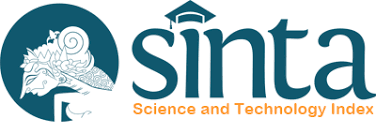THE INFLUENCE OF ISLAMIC BANKS, ISSI AND SBSN FINANCING ON INDONESIA'S GROSS DOMESTIC PRODUCT
Abstract
Abstract: The purpose of this study is to find out how financing, ISSI and SBSN affect gross domestic product. The results of this study are expected to be useful for the government and industry players in Indonesia in knowing the picture of the state of the financial sector and formulating policy strategies in the future so as to create high and stable real sector growth to be able to encourage economic growth in Indonesia. The results of the study show that: 1) The influence of Islamic Banking Financing has no effect on GDP. 2) ISSI has no influence on GDP. 3) SBSN has no significant influence on GDP. 4) Sharia, ISSI, and SBSN banking financing simultaneously have an influence on GDP.
Keywords: Influence of Financing, ISSI, SBSN, PDB, Sharia Banking
Abstrak: Tujuan penelitian ini adalah untuk mengetahui bagaimana pembiayaan ISSI dan SBSN terhadap produk domestik bruto. Hasil penelitian ini diharapkan dapat berguna bagi pemerintah dan pelaku industri di Indonesia dalam mengetahui gambaran keadaan sektor keuangan serta merumuskan strategi kebijakan pada masa yang akan datang sehingga menciptakan pertumbuhan sektor riil yang tinggi dan stabil untuk dapat mendorong pertumbuhan ekonomi di Indonesia. Hasil penelitian menunjukkan bahwa: 1) Pengaruh Pembiayaan Perbankan Syariah tidak memiliki pengaruh terhadap PDB. 2) ISSI tidak memiliki pengaruh terhadap PDB. 3) SBSN tidak memiliki pengaruh signifikan terhadap PDB. 4) Pembiayaan perbankan Syariah, ISSI, dan SBSN secara simultan memiliki pengaruh Terhadap PDB.
Kata Kunci: Pengaruh Pembiayaan, ISSI, SBSN, PDB, Perbankan Syariah
Downloads
References
Antonio, Muhammad Syafi'I. (2019). Sharia Banks: From Theory to Practice, Jakarta: Gema Insani
Ardi, Muhammad. 2018. The Effect of Sukuk on Economic Growth Indonesia. Iqtishaduna 9, no. 1.
Ardianto, T. (2016). Analysis of Factors Affecting the Poverty Rate of Regencies/Cities in East Java Province in 2007-2013. 9
Arsyad, L. (2018). Development Economics. Yogyakarta: STIE-YKPN
Bappenas. (2019). Attachment to the Presidential Regulation of the Republic of Indonesia Number 5 of 2018 concerning the National Medium-Term Development Plan (RPJMN) for 2010-2014. Jakarta
Benefactors, Ryhan Firdausy Noor, Mochamad Edman Syarief, and Kristianingsih Kristianingsih. 2022. "The Influence of Sharia Bank Financing, and Labor on West Java's GDP." Indonesian Journal of Economics and Management 2(2):368–78. doi: 10.35313/ijem.v2i2.3696.
BPS. (2016). Gross Regional Domestic Product of Provinces in Indonesia by Business Field. Jakarta: Central Statistics Agency
Daulay, A. N, Syahbudi, M. & Lubis, F. A. (2019). Economics Macro Islam (M. Yafiz, ed.; 1st ed., Vol. 1) FEBI UIN-SU Press.
Department of Social Affairs of the Republic of Indonesia. (2016). Principles of the Long-Term Development Plan (PJP) 2005-209 and Medium-Term Development (PJM) 2004-2009. Jakarta: Social Welfare Sector
Elinur. (2019). Analysis of Energy Consumption and Supply in the Indonesia Economy. Dissertation.
Ikhasan Harahap, M. (2022). Analysis of the Quality of Goods Delivery Services on Consumer Satisfaction at PT Pos Indonesia (Persero) Regional I Sumatra. Journal of Computer Science, Economics and Management (JIKEM), 2(1).
Ilhamy, M. L. N. (2018). Sharia Bank Financing Management. Febi Press
Imsar, N Nurhayati. (2023). Analysis Of Digital Economic Interactions, Economic Openness, Islamic HumanDevelopment Index (I-HDI) and Investment On Indonesia GDP Growth. Jurnal Pendidikan Islam. 12(01).
Indriani, R., & Habib, M. A. F. (2023). Pelaksanaan Gadai Dan Cicil Emas di Bank Syariah Indonesia KCP Malang Kepanjen 1 Dalam Perspektif Perbankan Syariah. Jurnal Cahaya Mandalika ISSN 2721-4796 (online), 4(3), 557-574.
Jhingan, M. (2016). Development Economics and Planning. Jakarta: PT Raja Grafindo Persada
Kamilah, A. I. L. N. (2019). The role of the Islamic microfinance institution industry in overcoming the problem of inequality and income distribution in the city of Medan. Journal of Islamic Economics and Business, 6(1).
Kuncoro, M. (2017). Development Economics Theory, Problems, and Policy. Yogyakarta: UPP AMP YKPN
Latifah, SIti. (2020). The Role of State Sharia Securities Sukuk (SBSN) in the Growth of Economic Development Indonesia. Islamic Economic Scientific Journal 6, no. 3
Normasyhuri, Khavid, Budimansyah Budimansyah, and Eko Triyadi. 2022. "The Impact of the Issuance of Government Bonds (SUN) and State Sharia Securities (SBSN) on Indonesia's Economic Growth in the Covid-19 Pandemic Era: An Overview of Islamic Economics." Scientific Journal of Islamic Economics 8(1):688. doi: 10.29040/jiei.v8i1.4619.
Ramadhanty, Rifka Putri, and Ilmiawan Auwalin. 2021. "The Effect of Sharia Commercial Bank Banking Financing on Provincial GDP in Indonesia in 2010-2019." Journal of Sharia Economics Theory and Applied 8 (1):8. doi: 10.20473/vol8iss20211pp8-17.
Riduan, Adi. (2019). Analysis of the Influence of State Sharia Securities on Economic Development in 2015-2018 in the Perspective of Islamic Economics. UIN Raden Intan Lampung
Roifah, Tri Nadhirotur, and Sukron Faris. 2022. "The Influence of the Islamic Capital Market on Indonesia's Economic Growth." Scientific Journal of Islamic Economics Vol.8 No.2(02):2110–19.
S, Burhanuddin. (2017). State Sharia Securities Law and Its Regulation. Jakarta: PT. King Grafindo Persada.
The author has full rights to the articles that has been sent to An-Nisbah: Jurnal Ekonomi Syariah. The author is responsible for the originality of the articles and all the references used in the journal script.







